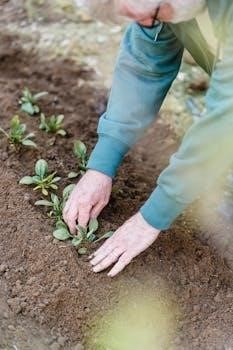South East Queensland’s climate allows for year-round vegetable gardening‚ offering fresh produce throughout the seasons. Understanding the specific planting times for each vegetable is key to successful harvests. This guide offers a comprehensive overview for both novice and experienced gardeners.
Understanding the SE Qld Climate for Gardening
South East Queensland’s subtropical climate presents unique opportunities and challenges for vegetable gardeners. The region experiences warm‚ humid summers and mild‚ relatively dry winters‚ which means traditional seasonal planting guides may not always apply. The intensity of the sun during warmer months can be extreme‚ requiring careful planning for sun exposure. The lack of well-defined seasons and minimal chilling in winter also impacts which vegetables will thrive. Gardeners need to be mindful of potential drought conditions and plan their watering accordingly. Understanding the local microclimates within SE Qld is also important as conditions can vary. Paying attention to these factors will help ensure a successful and bountiful vegetable garden. Knowing your local environment is crucial for optimal growth and harvest. Careful selection of plant varieties is also key.
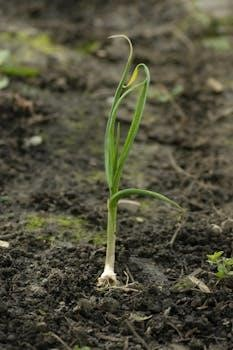
Seasonal Planting Guide
This section outlines the best times to plant vegetables in SE Qld‚ aligning with the region’s distinct seasons. We’ll cover Spring‚ Summer‚ Autumn‚ and Winter‚ providing insights into suitable crops for each period to optimize growth and yield.
Spring Planting (September-November)
Spring in South East Queensland‚ spanning from September to November‚ is a prime time for planting a variety of heat-loving vegetables. As the weather warms‚ it’s ideal for sowing seeds and planting seedlings that thrive in the increased temperatures and longer days. This period allows gardeners to capitalise on the mild conditions before the heat of summer sets in. Popular choices for spring planting include tomatoes‚ which are a staple in many gardens‚ as well as cucumbers‚ zucchini‚ and sweet corn. Leafy greens like lettuce and spinach can also be successfully planted during this time‚ taking advantage of the moderate temperatures. Additionally‚ consider planting broccoli and carrots. Ensure the last frost has passed before planting tomatoes. Spring is a great time to start a thriving vegetable garden in SE Qld‚ providing fresh produce for the coming months. This period encourages robust growth and sets the stage for a bountiful harvest.
Summer Planting in Subtropical QLD
Summer in subtropical Queensland presents unique challenges and opportunities for vegetable gardeners. The intense heat and humidity mean it’s crucial to select crops that can withstand these conditions. While traditional crops might struggle‚ it’s a good time to explore less common‚ heat-tolerant varieties. Consider planting vegetables like okra‚ which thrives in hot weather‚ and various types of Asian greens. Sweet potato is another great option for summer planting in SE Qld‚ enjoying the warm soil. Remember to provide adequate shade and regular watering to protect plants from the harsh sun. It’s also important to monitor for pests and diseases‚ which can be more prevalent in the humid conditions. This is a time to adapt your approach‚ moving away from some traditional crops and embracing those that love the subtropical summer. Focus on maintaining healthy soil and providing consistent moisture to keep your garden productive.
Autumn Planting (March-April)
March and April are significant months for vegetable planting in South East Queensland‚ offering a welcome shift from the heat of summer. This period is ideal for establishing a wide range of crops‚ as the weather is generally milder‚ and the soil retains some warmth. This makes it a prime time to plant many popular vegetables‚ including tomatoes‚ capsicums‚ and eggplants‚ providing they get in early enough. Leafy greens such as lettuce and silverbeet also thrive in the cooler conditions. Furthermore‚ root vegetables like radish and beetroot can be sown directly into the garden during this period. Other vegetables suitable for planting in March and April include beans‚ cucumber‚ zucchini‚ cabbage‚ broccoli‚ turnip‚ onion‚ and garlic. If you’re keen to try broad beans‚ parsnips‚ or cauliflower‚ it’s best to get them started without delay‚ to allow them to mature before the onset of winter. Autumn offers a diverse range of planting possibilities‚ setting the stage for a productive winter garden.
Winter Planting Considerations
While South East Queensland enjoys a relatively mild winter‚ certain considerations are crucial for successful vegetable gardening during this season. Although frost is not a major concern‚ the cooler temperatures and shorter daylight hours can impact plant growth. Selecting cold-hardy vegetables is essential. Options include leafy greens such as spinach and silverbeet‚ which can withstand colder conditions. Root vegetables like carrots and turnips also perform well in the winter months. Some brassicas‚ including broccoli and cabbage‚ can be planted for a winter harvest. It’s also important to note that while some traditionally summer vegetables‚ like tomatoes and capsicums‚ may be attempted early in the season‚ they will need to be planted very early in Autumn and may need protection. Soil preparation is still important during winter to ensure good drainage and nutrient availability. Consider using frost protection methods like cloches or row covers if you are planting things that may not survive the cold. Careful planning and attention to the needs of cool-season crops will help ensure a productive winter garden.
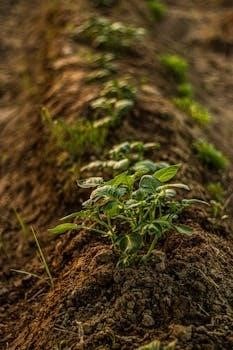
Specific Vegetables and Planting Times
This section details optimal planting times for specific vegetables in SE Qld. Understanding these timings is crucial for maximizing yields and ensuring healthy growth. We will cover popular choices and their ideal planting windows.
Tomatoes‚ Capsicums‚ and Eggplants
In South East Queensland‚ tomatoes‚ capsicums‚ and eggplants thrive when planted at the right time. Generally‚ these heat-loving vegetables are best started from seedlings after the last frost‚ typically around September to November. For a successful summer harvest‚ aim to get them in the ground during spring. In warmer areas‚ it is possible to extend the growing season by planting a second crop in late summer or early autumn. However‚ ensure they have enough time to mature before the cooler months. These plants require plenty of sunlight‚ well-drained soil and regular watering. Consider using a good quality potting mix or soil enriched with compost and organic matter. Regular feeding with a balanced fertilizer will support vigorous growth and abundant fruit production. These vegetables are vulnerable to pests and diseases‚ so monitor them closely and take action promptly.
Leafy Greens⁚ Lettuce‚ Silverbeet‚ Spinach
Leafy greens like lettuce‚ silverbeet‚ and spinach are versatile crops for South East Queensland gardens‚ offering a year-round harvest with strategic planting. For best results‚ sow lettuce and spinach seeds during the cooler months‚ from autumn through to early spring‚ to avoid bolting in the summer heat. Silverbeet‚ however‚ is more tolerant of warmer temperatures and can be grown year-round‚ though it may benefit from some afternoon shade during the hottest months. These leafy greens prefer fertile‚ well-drained soil rich in organic matter. Regular watering is essential‚ especially during dry periods‚ to prevent wilting and encourage rapid growth. Consider using a liquid fertilizer to promote leafy growth. Consistent harvesting of outer leaves will encourage continuous production throughout the growing period. Protect these plants from slugs and snails‚ which are common pests‚ and ensure proper air circulation to prevent fungal diseases.
Root Vegetables⁚ Radish‚ Beetroot‚ Turnip
Root vegetables like radish‚ beetroot‚ and turnip are excellent choices for South East Queensland gardens‚ thriving in the cooler months. Radishes are the quickest to mature‚ often ready for harvest within a month‚ making them suitable for succession planting. Beetroot and turnips take a bit longer‚ generally around 6-8 weeks‚ and are best sown in autumn or early spring. These vegetables prefer loose‚ well-drained soil‚ free of rocks and clumps to prevent misshapen roots. They require consistent watering‚ particularly during germination and early growth‚ to ensure the roots develop properly. Avoid over-fertilizing with nitrogen‚ as this can promote leafy growth at the expense of root development. Adding compost to the soil before planting is beneficial. Regular thinning is crucial to prevent overcrowding and allow each plant to reach its full size. Monitor for pests like root maggots and take appropriate measures to protect your crop. A balanced approach ensures a successful and tasty harvest.
Other Vegetables⁚ Beans‚ Cucumber‚ Zucchini‚ Cabbage‚ Broccoli
A diverse range of vegetables like beans‚ cucumber‚ zucchini‚ cabbage‚ and broccoli can be successfully grown in South East Queensland‚ each with specific needs. Beans thrive in warmer weather‚ with climbing varieties needing support structures. Cucumbers and zucchini are prolific producers during spring and summer but require ample space and consistent watering. Cabbage and broccoli‚ on the other hand‚ prefer cooler conditions‚ making autumn and early winter ideal planting times. These cruciferous vegetables need fertile soil and regular feeding to prevent pest attacks. For all these vegetables‚ choosing the right variety suited to SE Qld’s subtropical climate is crucial. Regular monitoring for pests and diseases is essential‚ and crop rotation can help prevent soil-borne issues. Proper spacing and adequate sunlight are also important for healthy growth. Ensure the soil is well-drained and enriched with organic matter for optimal yields. Succession planting can extend the harvest season for these delicious vegetables.
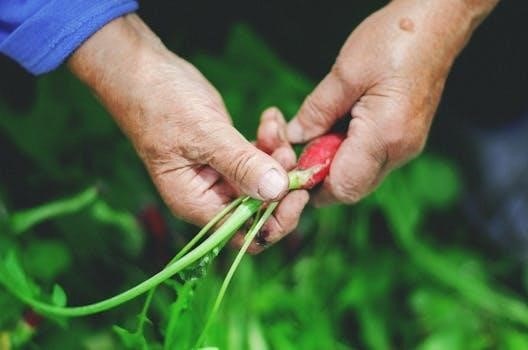
General Planting Advice
Successful vegetable gardening involves more than just planting seeds. Consider companion planting to enhance growth and deter pests. Crop rotation helps maintain soil health and reduces the risk of disease. Regular monitoring is key.
Companion Planting and Crop Rotation
Companion planting is a beneficial practice where specific plants are grown together to enhance growth‚ deter pests‚ or improve soil conditions. For example‚ planting basil near tomatoes can help repel insects while improving tomato flavor. Similarly‚ marigolds can deter nematodes and other harmful soil pests. Avoid planting peas near onions‚ as this combination can hinder the growth of both. Crop rotation is another essential technique in SE Qld gardening‚ involving the planned sequence of planting different crops in the same area each season. This practice helps prevent the build-up of soil-borne diseases and pests. It also improves soil fertility by varying the nutrients used by different plants. A good rotation plan involves alternating between heavy feeders‚ light feeders‚ and soil-improving plants such as legumes. Following these practices is important for a healthy and productive garden.
Avoiding Pest Problems
Pest management is crucial for successful vegetable gardening in SE Qld. A proactive approach is essential to avoid infestations that can damage crops. Regularly inspecting plants for signs of pests‚ such as aphids‚ caterpillars‚ and snails‚ is the first step. Employing physical barriers like netting or row covers can help protect vulnerable crops from flying insects. Encourage beneficial insects like ladybugs and lacewings by planting flowers nearby‚ these natural predators can help keep pest populations in check. Avoid using broad-spectrum chemical pesticides‚ as they can harm beneficial insects. Instead‚ opt for organic pest control methods such as neem oil‚ insecticidal soap‚ or diatomaceous earth. Crop rotation and companion planting can also help to disrupt pest cycles and prevent them from settling in. Maintaining a healthy garden through proper watering and fertilization can also make plants more resistant to pest attacks. Consistent monitoring and early intervention are key to avoiding significant pest problems in your garden.
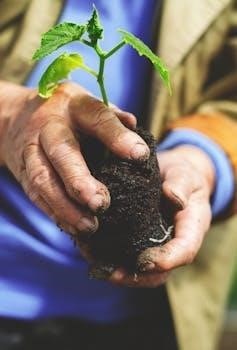
Resources for SE Qld Gardeners
Numerous resources are available for gardeners in South East Queensland to enhance their vegetable growing journey. Online platforms like the Queensland Gardening Pages and Gardening Australia offer valuable information‚ including monthly planting guides and specific advice for the region. Local councils often provide workshops and guides tailored to the area’s climate; Websites such as Love the Garden offer downloadable planting calendars and tips on companion planting. Additionally‚ community gardens and local gardening clubs are great places to connect with other gardeners‚ share knowledge‚ and learn from experienced individuals. Seed suppliers like Eden Seeds provide a variety of non-hybrid and heirloom seeds suitable for the region. Many online resources also give detailed information about growing specific vegetables‚ pest control‚ and soil management techniques. Utilizing these varied resources will help gardeners successfully navigate the challenges and joys of growing vegetables in SE Qld.
